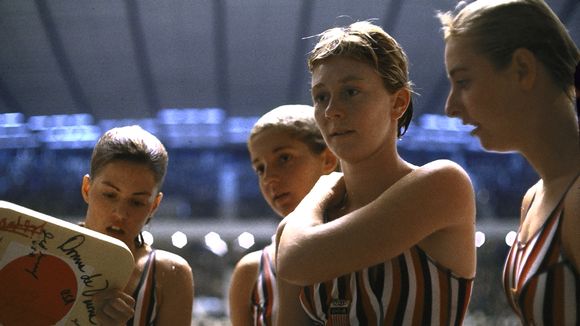
Cathy's daughter, Allison Brennan, was a gymnast before she took up swimming and diving.

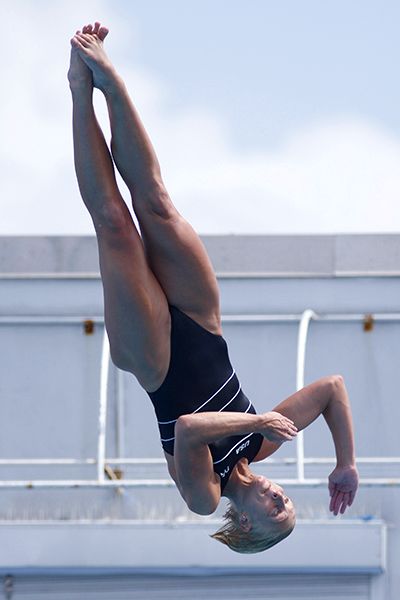
One Olympic dream that's come full circle
By Amy Rosewater
Special to ESPN.com
June 19, 2008, 5:39 PM ET
source
Forty-four years ago, two California swimmers traveled across the country to Astoria, N.Y., to compete in the Olympic swimming trials, each hoping for a spot on the 1964 U.S. team, which would compete in the Summer Games in Tokyo.
They didn't think much beyond swimming back then. Nor did they think much about each other, other than they wanted to touch the wall before the other one did.
These rivals, Sharon Finneran and Cathy Ferguson, who once trained together in Los Angeles, wound up becoming Olympic teammates. Finneran edged Ferguson for a spot on the Olympic team in 400-meter individual medley. Ferguson qualified for the Games in the 100-meter backstroke and was named to the medley relay. Ferguson captured two Olympic golds; Finneran came home with a silver.
They thought their bond would end in Tokyo. Finneran made a short-lived attempt to make the 1968 Olympic team and then went on to become a dental hygienist and had five children. Ferguson became a swimming coach and retired in 1996. She had three daughters and now is the executive director of a nonprofit organization called Girls Inc. in Wilmington, Del.
Yet now, 44 years later, their paths cross again. And there is no more of a fitting time for their lives to meet than this year, an Olympic year.
This weekend, both Finneran and Ferguson are planning to travel to Indianapolis for the U.S. Olympic trials as both of their daughters will be competing there with hopes of making the U.S. Olympic team, which will compete in Beijing in August.
Ariel Rittenhouse is Finneran's daughter and an Olympic hopeful in synchronized diving with partner Kelci Bryant. One of the youngest elite American divers at 17, she also is vying for a spot in the 3-meter event. Rittenhouse and Bryant won the bronze medal at the World Cup in Beijing, earning the United States an Olympic spot in synchronized diving.
Allison Brennan is Ferguson's 25-year-old daughter, who was a member of the 2007 world team and was the 2006 U.S. champion in the 3-meter event. She was an NCAA champion at the University of South Carolina and a four-time All-American.
So in June, Rittenhouse and Brennan will meet their Olympic fates.
And their mothers will be watching.
"The neat thing about having parents who have competed at this level is that they understand what their children are going through," Ferguson said. "It's hard to be a competitor and to understand that. I think Sharon and I both understand it."
But to understand this story, you really need to go back 44 years to those swimming trials in New York. Two years earlier, Sharon Finneran had been a world beater, setting seven world records and swimming the 400-meter individual medley so fast she could have qualified for nationals that year in the men's division. She wasn't at her peak in 1964, but she remained one of the toughest, scrappiest competitors in the field.
Ferguson was primarily a backstroker with the Los Angeles Athletic Club, but was so talented she was attempting to make the team in the 400 IM and other two freestyle events, as well.
The two women knew each other well. Both trained together for awhile with the Los Angeles Athletic Club before Finneran decided to relocate to Santa Clara in 1963 and both were both extremely hard workers. Finneran was known for three-a-day workouts and rarely missed a single one. Ferguson was a big believer in weight training in addition to swimming two workouts a day.
The 400 IM had been added to the event list for the 1964 Olympics, and Finneran, a world-record holder in that event in 1962 and 1963, desperately wanted to represent the United States in that race. Ferguson, who was gunning for Olympic spots in the 100 and 200 back, entered the 400 IM as well, but didn't expect to place. Ever the competitor, however, she wasn't just entering a race for kicks.
The race between Finneran and Ferguson proved to be one of the toughest battles of the trials.
All you have to do is mention the name Cathy Ferguson, and Finneran can give you a stroke-by-stroke replay of the race.
"I remember starting with the fly and then I knew my backstroke would be a little weak but I could make it up with the breaststroke," Finneran said. "I always knew where everyone was in the pool when I raced and I wasn't even thinking about Cathy during the breaststroke. Then I go into the free. I swim the first lap and do my flip turn and there she is. All I'm thinking is, 'Oh my God. Cathy Ferguson.'
"And I said to myself, 'I'm going to die before I let someone take my Olympic spot.'"
For the final seven yards or so, Finneran said she didn't take a single breath. She wound up third, behind Donna de Varona and Martha Randall and one-tenth of a second ahead of Ferguson. In those days, third place was good enough to make the Olympic team. (Now, only the top two finishers qualify.)
De Varona set a world record in that race, but as soon as she touched the wall, she turned her focus immediately on the race behind her, the one between Finneran and Ferguson. Leading up to the trials, de Varona and Finneran had been trading world records in the 400 IM and de Varona wanted to see how this race would turn out.
"Sharon was my biggest rival," de Varona said. "But I was hoping she would make the team."
At the Olympics, de Varona took the gold medal, followed by Finneran and Martha Randall in an American sweep.
When Finneran was inducted into the International Swimming Hall of Fame in 1985, she chose de Varona to introduce her because as Finneran told her, "We made each other better."
All three women were teammates in Tokyo, but as de Varona put it, "You're really not teammates until you get on a relay."
It's amazing how time can change that ... or not.
When Finneran was asked about her daughter and Ferguson's daughter both vying for Olympic spots now, she laughed and said, "We're enemies again."
Finneran and Ferguson didn't even realize that both of their daughters were diving until about a year ago when they both attended a national diving meet. Ferguson was sitting in the stands when she noticed a woman who looked an awful like Finneran. She turned to her daughter, Allison, and said, "That gal looks a lot like a gal I swam against -- Sharon Finneran."
It was Finneran with one change, she used her married name, Sharon Rittenhouse. The two had fun chit-chatting and catching up, and soon the so-called enemies realized how much they had in common.
"We both complain about how difficult it is to have daughters who dive," Ferguson said.
And how difficult it is to have them compete against each other. Just like their mothers, they will compete for spots on the Olympic team. Should they both make it, they will be teammates just as their moms were more than four decades ago. And just like back then, you're teammates, but you're not. There are medals to be won and not everyone can win them.
As former Olympians, Finneran and Ferguson know how special the Games are and how much they have meant to their lives. They both competed in a pre-Title IX, pre-major sponsorship era, when it wasn't common for girls to be jocks, and they both marvel at how much times have changed for their daughters.
Both passed on their athletic passion, although neither of them ever expected their daughters to pursue the Olympics, much less in diving. Still, their daughters understood how important the Olympics were to their family, even at a young age. Allison recalls bringing in her mom for show and tell.
"I even brought her when I was a junior in high school for my Spanish class and I explained about my mom's accomplishments in Spanish," Brennan said.
Ariel said her mom told her how much the swimmers were showered with attention by the Japanese fans. She also remembers looking at black and white photographs of her mom from the 1964 Games. "It's funny to look at those swimsuits," she said.
Both mothers also know too well the trials of being Olympic medalists and having children who also want to share in that dream. Being an Olympic mom can be a double-edged sword: If your kid is lucky, then great, he or she will win a medal, too. If not, then they can't match their parent's success. The running joke with Finneran is she told all five of her children that they had to be involved in a sport so they'd stay out of trouble -- if they didn't take up a sport, then they'd have to swim. None of them followed that Olympic swimming path. Of five children, only Ariel is close to becoming an Olympian.
Although Finneran never pushed the Olympics on her daughter, Finneran has become her biggest supporter. Finneran even moved from her California home (her husband, a commercial insurance broker, still lives there) to live with Ariel in downtown Indianapolis. Ariel trains at the national training center. It's been a family cycle. When Finneran was younger, her mother relocated from Florida to California so Finneran could pursue her Olympic dream.
"If Ariel wasn't my youngest, it would be impossible for me to make this kind of commitment because all of my children are important to me," Finneran said.
On days when Ariel isn't feeling up to training, all she needs to do to get inspired is look at her mom. "She's always by my side," Ariel said.
Ferguson has been supportive as well, traveling worldwide for competitions and paying the bills (along with Allison's father) for Allison's training. Allison is a college graduate and continues to train with her college coach at the University of South Carolina in Columbia. Although Ferguson doesn't live with her daughter, they often talk on the phone as Ferguson often finds herself in the role of a telecommunications cheerleader.
"If she's happy, then I'm happy," Ferguson said. "I will give her whatever she needs, but really my job is to work on the mental side of the game."
As wonderful of a ride as it has been for both moms, it has been exceptionally stressful as well. For Finneran, she has had to spend about a year and a half living apart from her husband. For Ferguson, it's been the stress of trying to show long-distance support.
"What I keep trying to let Allison know is that Allison is not Allison the diver to me," Ferguson said. "She's Allison, my daughter, and that's the key."
"I finally decided to get it together," said Finneran, who sought help from a psychologist to calm her nerves. "And I'm still nervous.
"You just love this girl so much," Finneran added. "I talk to other mothers and we're all the same. Watching our kids dive is the hardest thing we have to do in our lives. It's so hard because being in the Olympics is great. It really is. But it's also luck."
Echoed Ferguson: "It's so much easier being the athlete than it is being the mom watching. You want it so much for your child, but there are only so many spots. The Olympic year brings out really strange and really wonderful things. I just hope that regardless of what happens that she enjoys the journey."
For these Olympic moms, they can only hope and wait -- once again, together.
"Just keep your fingers crossed and your toes crossed," Ferguson said. Then she added: "For both girls."
Ditto for the moms.
Diving is in their blood
What has made the journey somewhat smoother for Ariel and Allison is that they have the Olympics in their genes and some diving talent in their blood.
Ariel's uncle (Sharon Finneran's younger brother), Michael, was an Olympic diver in 1972 and was the first to earn perfect 10 scores. Allison's father, Larry Brennan, was a diver who competed in the Olympic trials.
"Ariel and Michael talk quite a bit," Finneran said. "He always seems to know just the right thing to say."
It seems as if nothing would have prevented Ariel from diving. She was just 2 when she was performing her first ones. "You just couldn't get me out of the water," Ariel said.
But there were no diving programs for girls her age, so she picked up gymnastics. By the time she was 7, however, she quit gymnastics and took up diving. Her sister stuck with gymnastics for a while and now is a dancer. All three of her brothers were athletic -- one was involved in water polo, another was a volleyball player and the third was an avid golfer.
Like Ariel, Allison also started out as a gymnast, and she even became a California state champion when she was 10. Later, she suffered an injury and decided to take up swimming, and her mom became her coach.
When her mom retired from coaching, Allison decided to stop swimming and start diving. Her older sister, Kellie, made the transition from gymnastics to diving and Allison liked the combination of doing graceful movements and being in the water. It also helped that there was a 1-meter diving board in the family's backyard. Kellie wound up diving until after the 2004 Olympic trials. Allison's oldest sister was a ballet dancer.
"I never felt that I had to be the best for my parents to love me," Allison said. "But I think it would mean a lot for their daughter to accomplish something that she worked so hard to achieve."
Amy Rosewater, a freelance writer based in Baltimore and frequent contributor to ESPN.com, balances motherhood and reporting, and says she has no chance of qualifying for the Olympics. Her two daughters are Katie (age 6) and Josie (4).
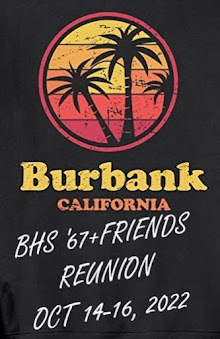





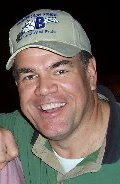

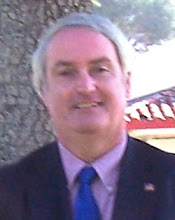

No comments:
Post a Comment